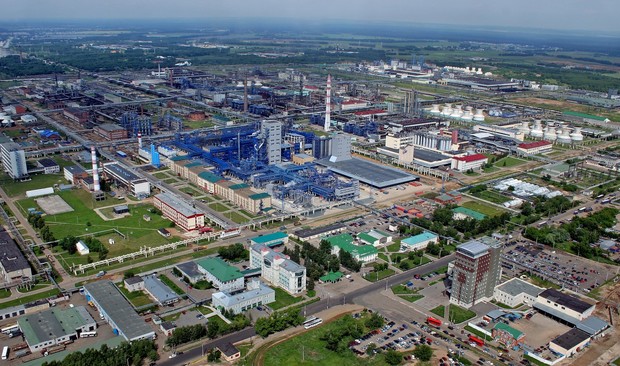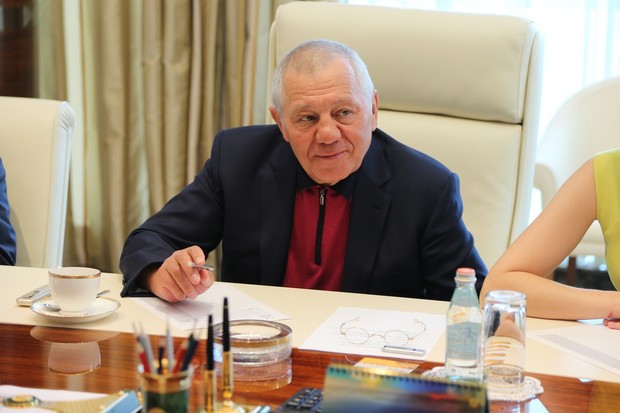Albert Shigabutdinov, TAIF: ‘Construction of a catalyst factory in Tatarstan is a done deal’
Univation Technologies, a 100% subsidiary of the American petrochemical giant The Dow Chemical, held negotiations in Kazan with its strategic partner TAIF Group of Companies. The president of the company from the United States of America Steven Stanley told about the changes that took place in the business structure of his enterprise and plans to continue cooperating with TAIF GC. Then the head of the petrochemical holding Albert Shigabutdinov offered him to open a factory in Alabuga SEZ to produce catalysts. A correspondent of Realnoe Vremya knew what they were speaking about.
Univation offers to reduce catalyst consumption rate
Heads of Univation Technologies visited their partner TAIF GC to tell about the changes in the company. The business structure of the American company went through changes last year. One of the largest world chemical companies The Dow Company made a deal on the purchase of the share of ExxonMobil Company in Univation Technologies, LLC in May 2015 and became a 100% owner of the latter. Earlier Univation Technologies was a 50/50 joint venture of ExxonMobil and The Dow Chemical. Naturally, any company aims at solving domestic problems while changing its structure. However, Univation Technologies president Steven Stanley says the company managed to cope with these processes easily and did not allow the clients feel the changes.
'Sales of licences and researches in Univation have not changed regardless of Exxon's withdrawal from the composition of the company,' Steven Stanley assured. 'Ownership form is the only thing that has changed. Investments in the improvement of catalysts have also increased'. Undoubtedly, the latter interested Kazanorgsintez as the largest Unipol technology licensee.
It should be reminded the American company licensed Kazanorgsintez, which is a part of TAIF GC, to design, construct, produce and sell linear and bimodal polyethylene with an annual capacity of 440,000 tonnes worldwide. The project also presupposed a modernisation of two out of three active LD PE lines. Now LD PE production of KOS has three lines with a capacity of 220, 195 and 75,000 tonnes at its disposal. It totals 490,000 tonnes per year.

Univation Technologies was able to see these capacities on 3 August during their visit to operating sites of Kazanorgsintez. Univation Technologies president Steven Stanley gave the director general of KOS Farid Minigulov a certificate that proves a production of 1,300k tonnes of polyethylene since 2007, that is to say, during their cooperation when the Tatarstan enterprise got its first new generation industrial batch of LD PE – PE-100. This polyethylene was produced according to a one-reactor scheme, as it is stated in the licence.
TAIF is interested in catalyst factory in Alabuga SEZ
After the visit to Kazanorgsintez, Univation Technologies offered to reconstruct a B reactor of LD PE production. But here it is all about the increase of raw material supply. It is what specialists of TAIF GC are actively working on. This is why it is mainly a long-term offer. The American company also offered to do a trial test of the updated catalyst in February next year. The commercial director of Univation Technologies in Russia, CIS countries and Eastern Europe Yury Golubev said the use of this catalyst will enable to reduce its consumption rate by 15-20% while producing polyethylene.
At the meeting the American company was the first to mention the sanctions whose action was extended by the U.S. President Barack Obama in spring for one year more. At the moment the western restrictions have not made their amendments in the work of the two chemical enterprises. But in case of greater tension between the countries, Univation Technologies and Kazanorgsintez agreed to produce more catalysts in reserve. Univation Technologies confirmed its readiness to increase the supply if necessary. 'Although we have been witnessing the imposition of sanctions against different countries for 50 years, no case led to a ban on catalyst sale,' Steven Stanley assured.
The director general of TAIF PJSC Albert Shigabutdinov doesn't think the increase of catalyst supply is a solution of the problem. 'Catalysts and their production are a problem of a general concern for us,' Albert Shigabutdinov expressed his worry.

'Catalysts and their production are a problem of a general concern for us'
The director general offered a drastic solution – The Dow Chemical and Univation Technologies need to build a catalyst plant in Alabuga SEZ. 'It may be quite a profitable project for you. Raw materials for catalyst production exist in Russia, and their price is lower than in the USA,' the director general of TAIF made an unexpected offer to the American company. Dr Stanley, in turn, told the company already started a construction of four catalyst plants. They are all located in the United States. 'We can start the new construction in Russia only after when we put the planned plants into operation,' the president of Univation Technologies told. In answer to it, Albert Shigabutdinov insinuated that an agreement with another company might appear by that moment.
'The construction of catalyst plants in Tatarstan is a done deal. Strategic plans of TAIF till 2020 include a rise in ethylene production by from 600,000 tonnes to 1,600k tonnes per year. What is more, the volume of polyethylene market of Russia will increase to 14m tonnes per year in the next 10 years. Now the question is who is going to be the first to decide to build a catalyst plant,' Albert Shigabutdinov explained.
The heads of TAIF GC also told their American partners about their intention to launch a polyethylene production in Kazanorgsintez with a capacity of 300,000 tonnes for high-voltage cable jackets. However, this production needs a polymer that has other characteristics. 'As Univation Technologies can offer only basic polyethylene, we can't be partners. But we are ready to become an intermediary in negotiations on this project with The Dow Chemicals,' Steven Stanley summed up.
Realnoe Vremya online newspaper continues to follow the development of the agreement that has been created between the two holdings. The newspaper will prepare a piece about future projects based on the results of the decisions taken.